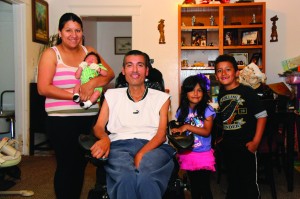Ruben Valencia: Family first
 Summer 2013
Summer 2013
When Ruben Valencia came to the end of his final interview to become a US citizen, the examiner offered to administer the oath of citizenship then and there. Valencia, who has amyotrophic lateral sclerosis (ALS) and is wheelchair-bound, insisted on delaying this moment, choosing instead to attend the full-scale naturalization ceremony in Oakland.
The ceremony was the culmination of years of effort on the part of Valencia, Mission Hospice staff and volunteers, and other supporters. Like most things in his life, Valencia’s citizenship is a means to help his family. Ruben Jr., 8 this year, Alejandra, 6, and Dylan, who was born in April, have never known their father without the disease, his wheelchair, and his helpers. They are American-born, but his wife Elizabeth, a native of El Salvador, needs to be naturalized to guarantee that the family can stay here after Ruben is gone.
Valencia, who was born in Mexico, came to the US at age seven. He grew up in South San Francisco and attended Burlingame High School. In 2003, he met Elizabeth at the company where he was the warehouse manager. They married in 2004, which also was the year Ruben was diagnosed with ALS, a condition in which the body’s muscles eventually cease to function.
“The doctor told me there isn’t a cure,” Valencia recalled during an interview. Mission Hospice social worker Gloria Gutierrez helped to translate because ALS makes it difficult for him to be understood. Hospice volunteer Curt Luck said he and Ruben have had to develop new ways to communicate. From normal speech, Ruben went to using his computer. He manipulates the mouse with his feet to spell out words.
Valencia was more able when he joined the Mission Hospice Transitions program in fall 2008. He was certified for hospice care shortly thereafter. His Mission Hospice team includes Gutierrez, Luck,
nurse Jane Tobin, and Dr. Ken Barnes.
Luck has seen a number of changes in Valencia’s physical abilities, but not in his outlook.
“You can tell from his wedding pictures that he was a big guy, and now he’s a lot smaller, but his mind hasn’t changed at all,” he said. “His quality of life remains good because he has such a great attitude. He inspires me with his emotional maturity, patience, and good will.”
Luck said it took more than three years to find an attorney who could lead Ruben through the anxiety-charged citizenship process. Over the years, the team also has worked to get the family adequate housing and subsidized day care for the children, supervised their in-home caretakers, trained the caretakers to use a Hoyer lift to make transfers, and obtained specialized wheelchair equipment.
The team recently replaced Ruben’s broken computer, his main link to the outside world through Facebook and other media. A grant from the Dream Foundation enabled the Valencias to attend a family reunion in Los Angeles.
“All this,” Gutierrez adds, “has been instrumental in Ruben being able to remain at home with his family.”
Without hospice, Ruben would undoubtedly be in a nursing facility instead of helping to raise his children. Hospice care is a way he can take care of his loved ones. Although his future with the disease is not good, he prefers to remain positive. For his wife and children, every day is precious. Asked what he wants for the future, Ruben replies, “Just to be with my family.”
